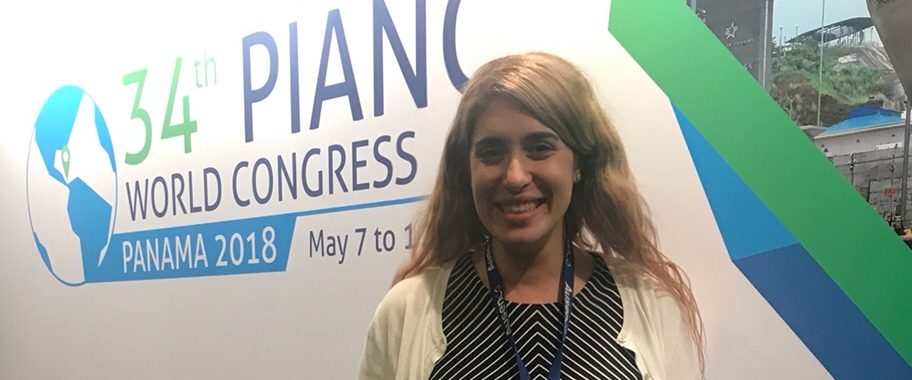UTNBA graduate represented Argentina at the XXXIV PIANC 2018 World Congress
Her paper was accepted by the scientific committee and she was one of the six speakers from Argentina

Eng. Ingrid Klimann, graduate from UTNBA, represented Argentina in the XXXIV PIANC 2018 World Congress, where she presented her paper entitled “Container terminal planning towards optimizing supply chain logistics”, thus being one of the six Argentine speakers at the Congress.
“I represented our country in the field of infrastructure and port logistics. There were six Argentine speakers presenting papers, which had been previously accepted by the scientific committee. I spoke about the importance of the supply chain and the port, and what work should be done in order to achieve efficient flows and a port terminal productive model,” the Industrial Engineering graduate explained.
According to the work conducted by Klimann, proper planning allows the integration of different services which add value to a port terminal and which can be developed “as a multimodal operation platform serving the supply chains which go through it.”
This not only makes it possible to minimize and optimize operation times; by setting short-, medium- and long-term strategies “it is also possible to position the terminal as a dynamic connection node in logistic chains, accompanying more competitive markets in the region where they want to develop or make their economy grow,” according to the work presented by the Graduate at the Congress.
In her paper, Klimann argues that supply chains require container port terminals which are “competitive and in line with the demands of the dynamic flows going across them. For this purpose, port planning engineering and its strategies provide high competitiveness and leadership in operations for complex situations both on the ground or in water.”
But the geographic differences, the available connections and other factors have an impact on the efficiency of the supply chains they support.
In this sense, the graduate considered the case of the container terminals located in the riverbanks of Ciudad Autónoma de Buenos Aires and the Dock Sud district to show how, when difficulties resulting from geographic location or terrain distribution arise, engineering provides benefits in port terminal planning.
“Engineering allows it to develop their processes with high efficiency, by designing appropriate strategies for the ground and water flows it manages. It is applied in planning in relation to the segregations of export shippings in the yard, unload of import and transhipment containers, weighing and controls with scanners, delivery and reception of empty containers, vessel unloading and loading, delivery of import containers, appropriate yard design and the distribution of operational resources, which results in a highly productive terminal,” the study says.
The beginnings of her passion
Klimann stated that she has always worked in the area of logistics: “I started when I was very young, when I was studying. I first worked mainly in the area of trucks and when I had the chance, because it was not easy, I got a job at the port and became a port woman, which is what I wanted. I have been exclusively devoted to vessels for the past four years now, always in the area of logistics,” she said.
The graduate recalled how she first got interested in logistics: “I initially fell in love with Engineering and shortly after, with logistics. Then I went to Panama on vacation for the first time. Part of my tourism itinerary included visiting the Panama channel and when I saw it I knew that that is what I wanted for my life. I saw not only vessels there but the whole system. That was the goal I had in mind during the course of my studies, because I knew that that is what I wanted to do.”
Klimann stated that one of the teachers that motivated her the most during her studies was Eng. Rubén Garay, who teaches the General Economics class, in which she has been a teaching assistant for the last 9 years. “He taught us his vision on the role of engineering in society and I recall looking up to him for that and for how he taught us to think, to analyze things. When the moment arrived, he was the one handing me my diploma,” she stated.



